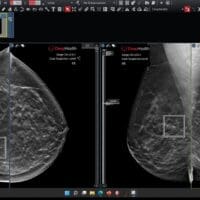

House Majority Leader Melissa Minor Brown speaks at a press conference unveiling results of a guaranted income program for pregnant women and their babies.
A pilot program that gave 40 pregnant New Castle County women $1,000 a month for 24 months had greater than expected health and other benefits, the sponsors said.
The program saw a 324% return on investment, organizers said at a press conference announced the result.
Among its outcomes:
- $229,520 in reduced hospital stays
- $21,600 in reduced emergency department visits
- 50% of the monthly stipend went directly toward groceries/food, household items/basic needs, and gas/auto/transportation; 30% of which went directly to groceries/food
- 89% of the participating moms received prenatal care
- 81% of their babies had no complications at birth
The $1,000 a month was in addition to being eligible for the federal Supplemental Nutrition Program for Women and Children (WIC) and Supplemental Nutrition and Assistant Program (SNAP, once called food stamps), and seemed to stimulate interest in the programs.
Expanding the Guaranteed Basic Income program could help reduce both infant and maternal deaths, while helping women take better care of themselves and their children, said Delaware House Majority Leader Melissa Minor-Brown, D, New Castle.
“At this time, we are focused on sharing the strong results of this pilot with our partners and the public in the hopes that we can all advocate for supporting sustainability of the program,” Minor-Brown said. “The ultimate goal would be a continuation and expansion of the GBI program throughout Delaware.”
The program was a project of the Delaware Healthy Mother and Infant Consortium, created to replace the Infant Mortality Task Force. Its duties, according to state law, include recommending “legislation and regulations that will enhance the health of women of childbearing age and infants.”
Minor-Brown has been an advocate for material and infant health, sponsoring a package of bills in 2022 referred to as the “momnibus” bill. All passed and were signed into law.
The consortium was tasked with preventing infant and maternal mortality as well as improving the health outcomes of infants and women of childbearing age throughout Delaware.
The program is not helping anyone outside of Wilmington, pointed out State Rep. Ruth Briggs King, R-Georgetown.
“It’s limited by ZIP code and that means those in Kent and Sussex aren’t getting same opportunities or benefits in areas that are rural with bigger challenges,” Briggs King said.
The state decided to fund doulas and that should help fill the gap, she said.
“Handing out additional money to those with existing benefits is unfair to working families struggling in this unprecedented inflation time,” she said.
Touting the benefits of a program and later introducing legislation to fund it is a familiar route to approval in the current Democrat-heavy state Legislature.
Efforts were not successful to reach Minor-Brown to ask if she intended to do that.
Pregnant income rules
Delaware’s pilot pregnancy income program, which began in 2021, was one of many similar programs around the nation.
Paid for with state and federal money, the Delaware program chose participants who fell below the federal poverty level threshold, were in their first or second trimester of pregnancy, and lived in a designated high-risk Healthy Women Healthy Babies ZIP code in Wilmington.
The participants received the money in the form of a debit card and could use it for food, transportation costs, education, rent, baby supplies and other essentials.
The women also attended evaluations every three months to offer feedback, which helped organizers understand what was and was not working, and why.
The participants also were offered wraparound services, such as meeting with a case worker or spending time with a financial coach and career team.
RELATED STORY: Reps. share personal experiences with doulas
In addition to the 324% return on the investment, the women and babies showed notable improvements in their health, better access to needed resources such as the federal Supplemental Nutrition Program for Women and Children (WIC) and Supplemental Nutrition and Assistant Program (SNAP, once called food stamps) and increased access to affordable housing and job opportunities.
The women were followed extensively and the data showed outstanding results, including cost savings, said Dr. Pricilla Mpasi, chair of the consortium.
Giving people the resources they need — money, access to health services before and during pregnancy, mental health care, help with WIC and SNAP benefits, job searches, and affordable housing—both mom and baby thrive,” Mpasi said. “This program shows us that when you empower pregnant women by putting them in driver’s seat for how they utilize resources to meet their needs, they will change the health trajectory of their lives, and their babies’ lives for the better.”


Betsy Price is a Wilmington freelance writer who has 40 years of experience.
Share this Post








